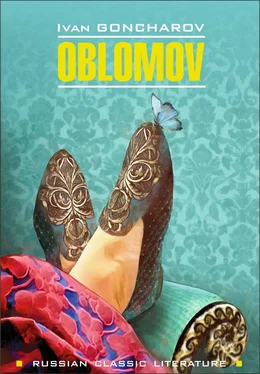Zakhar, too, was often tired of his master. Having served his term as a footman in his youth, Zakhar had been appointed to look after the young master; from that day he began to regard himself as an article of luxury, an aristocratic accessory of the house, whose duty it was to keep up the prestige and splendour of an old family and not to be of any real use. That was why, having dressed the young master in the morning and undressed him in the evening, he spent the rest of the day doing nothing at all. Lazy by nature, he became even more so by his upbringing as a flunkey. He gave himself airs before the servants, did not take the trouble to set the samovar or sweep the floors. He either dozed in the hall or went to have a chat in the servants’ hall or the kitchen; or he did neither, but just stood for hours at the gates, his arms crossed, and looked dreamily about him. And after such a life, he was suddenly burdened with the heavy task of doing the work of a whole household single-handed! He had to look after his master, sweep and clean, and run errands! No wonder he became morose, bad-tempered, and rude; no wonder he growled every time his master’s voice forced him to leave the stove. In spite, however, of his outward sullenness and unsociableness, Zakhar possessed a soft and kind heart. He even liked to spend his time with children. He was often seen with a crowd of children in the courtyard or by the gate. He settled their quarrels, teased them, organized games, or simply sat with one child on each knee, while another little rascal would throw his arms round his neck from behind or pull at his whiskers.
And so Oblomov interfered with Zakhar’s life by constantly demanding his services and his presence, while Zakhar’s heart, his talkative nature, his love of idleness, and a perpetual, never-ceasing need for munching something drew him to the gate, or to his lady-friend, to the shop, or to the kitchen.
They had known each other and lived together for a very long time. Zakhar had dandled little Oblomov in his arms, and Oblomov remembered him as a quick and sly young man with a prodigious appetite. Nothing in the world could sever the old ties between them. Just as Oblomov could not get up or go to bed, brush his hair, put on his shoes, or have his dinner without Zakhar, so Zakhar could imagine no other master than Oblomov and no other existence than that of dressing him, feeding him, being rude to him, cheating him, lying to him and, at the same time, inwardly revering him.
Having closed the door behind Tarantyev and Alexeyev, Zakhar did not sit down on the stove, but waited for his master to call him any minute, for he had heard that Oblomov was going to write letters. But everything in Oblomov’s study was as silent as the grave.
Zakhar peeped through the chink in the wall – and what did he see? Oblomov was lying quietly on the sofa, his head propped on his hand; a book lay open in front of him. Zakhar opened the door.
«Why are you lying down again, sir?» he asked.
«Don’t disturb me, you see I am reading», Oblomov said curtly.
«It’s time to wash and to write», Zakhar said mercilessly.
«Yes», Oblomov said, coming to himself. «As a matter of fact it is. I’ll be ready directly. You go now. I’ll think».
«How did he manage to lie down again?» Zakhar growled, jumping on the stove. «He’s not half quick!»
Oblomov, however, managed to read the page which had turned yellow during the month since he had last read the book. He put the book down, yawned, and then began thinking of «the two misfortunes».
«What a bore!» he whispered, stretching his legs and tucking them under him again. He felt like lying like that in comfort and dreaming. He gazed at the sky, looking for the sun that he loved so much, but it was right overhead, shining dazzlingly on the whitewashed wall of the house behind which Oblomov watched it set in the evening.
«No», he said to himself sternly, «first to business and then…»
In the country the morning would long have been over, but in Petersburg it was just drawing to a close. From the courtyard a mingled sound of human and animal noises reached Oblomov’s ears: the singing of some strolling street musicians, accompanied by the barking of dogs. A sea monster was being brought for show, hawkers shouted their wares in all sorts of voices.
He lay on his back and put both hands under his head. Oblomov was busy with his plan for reorganizing his estate. He rapidly ran through several important, vital points about the rent he was going to charge for leasing his land, the fields that had to be ploughed, thought of a new and sterner measure against laziness and vagrancy among the peasants, and went over to the subject of arranging his own life in the country. He was preoccupied with the problem of building his new country house; he dwelt pleasurably for a few minutes on the arrangement of the rooms, made up his mind about the size of the dining-room and billiard-room, thought on which side the windows of his study would look, and even remembered the furniture and carpets. After that he decided where to erect the outbuildings, taking into account the number of guests he intended to entertain, and allotted the space for the stables, barns, servants’ quarters, and so on. At last he turned his attention to the garden: he decided to leave all the old lime trees and oaks, to cut down the apple and pear trees and plant acacias in their place; he thought of having a park, but making a rough estimate of the expenses, found that it would cost too much and, leaving it for the time being, passed on to the flower-beds and hot-houses. At this point the tempting thought of the fruit he would gather flashed through his mind so vividly that he suddenly transferred himself to the country as it would be several years hence when his estate was already reorganized according to his plan and when he lived there permanently.
He imagined himself sitting one summer evening at the tea-table on the veranda under an impenetrable canopy of trees, lazily inhaling the smoke from a long pipe, dreamily enjoying the view from behind the trees, the cool air, the stillness; in the distance the com in the fields was turning yellow, the sun was setting behind the familiar birch-wood and spreading a red glow over the mirror-like surface of the pond; a mist was rising from the fields; it was getting cool, dusk was falling; the peasants were returning home in crowds. The idle servants were sitting at the gate; cheerful voices came from there, laughter, the sound of a balalaika; girls were playing a game of catch; his own little children were playing round him, climbing on his knees, putting their arms about his neck; at the samovar sat – the queen of it all – his divinity – a woman – his wife! Meanwhile, in the dining-room, furnished with elegant simplicity, bright, friendly lights were lighted, and the big, round table was being laid; Zakhar, promoted to butler, his whiskers perfectly white by now, was setting the table, placing the glasses and the silver on it with a pleasant ringing sound, every moment dropping a glass or a fork on the floor; they sat down to an abundant supper; Stolz, the comrade of his childhood and his faithful friend, was sitting next to him, as well as other familiar faces; then they went to bed…
Oblomov’s face suddenly flushed with happiness: his dream was so vivid, so distinct, and so poetical that he at once buried his face in the pillow. He suddenly felt a vague longing for love and peaceful happiness, a keen desire for his native fields and hills, for a home with a wife and children of his own… After lying for five minutes with his face in the pillow, Oblomov slowly turned over on his back again. His face shone with tender, warm emotion; he was happy. He stretched out his legs slowly and with delight, which made his trousers roll up a little, but he did not notice this slight disorder. His obliging imagination carried him lightly and freely into the far-away future. Now he became absorbed in his favourite idea: he was thinking of a small group of friends settling in villages and farms within ten or fifteen miles of his estate, who would visit each other daily in turn, and dine, sup, and dance together; he saw nothing but bright days and bright, laughing people, without a care or a wrinkle, with round faces and rosy cheeks, double chins and insatiable appetites; it was going to be a perpetual summer, everlasting gaiety, lovely food, and sweet leisure…
Читать дальше












